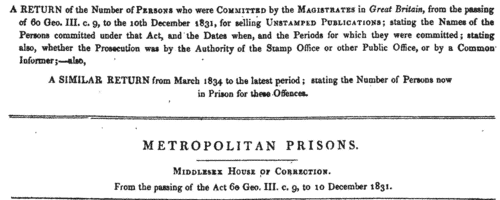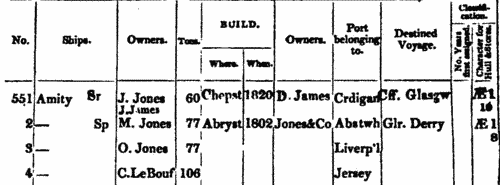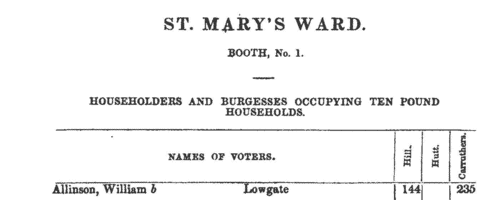Add this eBook to your basket to receive access to all 149 records. Our indexes include entries for the spelling ablett. In the period you have requested, we have the following 149 records (displaying 41 to 50): These sample scans are from the original record. You will get scans of the full pages or articles where the surname you searched for has been found. Your web browser may prevent the sample windows from opening; in this case please change your browser settings to allow pop-up windows from this site. Dissolutions of Partnerships
(1826)
Trade partnerships dissolved, or the removal of one partner from a partnership of several traders
| Sample scan, click to enlarge

| Bankrupts
(1828)
Bankruptcy notices for England and Wales: bankruptcy often caused people to restart their lives elsewhere, so these are an important source for lost links
| Sample scan, click to enlarge

| Insolvents
(1828)
Insolvency notices for England and Wales: insolvency often caused people to restart their lives elsewhere, so these are an important source for lost links | Sample scan, click to enlarge

| Unclaimed Dividends
(1828)
Names of creditors yet to claim dividends from bankrupts' estates | Sample scan, click to enlarge

| Bankrupts
(1829)
Bankruptcy notices for England and Wales: bankruptcy often caused people to restart their lives elsewhere, so these are an important source for lost links
| Sample scan, click to enlarge

| Cambridgeshire Voters: Cottenham
(1832)
The poll on the election of three knights of the shire to serve in Parliament for the county of Cambridge, was taken at Cambridge, Royston, Newmarket, Ely, Wisbech and Whittlesea 18 and 19 December 1832. The candidates were Henry John Adeane esquire, Richard Greaves Townley esquire, Charles Philip Yorke esquire and John Walbanke Childers esquire. This poll book sets out the names of the voters in alphabetical order hundred by hundred and parish by parish. The voters' full names are stated, surname first. The right hand column records their votes. The new qualification for suffrage in the counties, after the passage of the 1832 Great Reform Bill, was the possession of a freehold estate worth 40s a year or more, a copyhold or long leasehold of £10 a year or more, or a tenancy or short leasehold of £50 a year or more.
| Sample scan, click to enlarge

| Liverpool Voters: Burgesses and Freemen
(1832)
A poll for the election of Members of Parliament for the Borough of Liverpool, between William Ewart esquire (E), Lord Viscount Sandon (S), Thomas Thornely esquire (T) and Major-General Sir Howard Douglas, baronet (D), took place on 12 and 13 December 1832. The poll book lists all voters with full name (surname first), occupation, address, and initials indicating for whom they voted. The lists are in six sections: Everton, Kirkdale, the parish of Liverpool, Toxteth Park, West Derby, and Liverpool burgesses and freemen. All householders of property worth £10 a year of more were entitled to vote. | Sample scan, click to enlarge

| Gaoled Newspaper Vendors in Kirkdale House of Correction
(1822-1833)
The 1815 Stamp Act increased the tax on newspapers to fourpence a copy. Many radical newspaper publishers and the booksellers and newsagents who sold their popular papers ignored the law, and were liable to suffer prosecution either by authority of the Stamp Office which regulated the tax or by a common informer. In 1836 the House of Commons ordered these returns to be made from each prison, giving details of the convictions that had been made under the Act. The returns are not entirely consistent from one gaol to another, but most give names, dates, and period of imprisonment. | Sample scan, click to enlarge

| Masters of British Merchantmen
(1834)
Lloyd's Register of British and Foreign Shipping was established in 1834, following the demise of two earlier societies for registering shipping in Britain. The new register in 1834 was created from an alphabetical list of British ships with no more detail than name, master's name, tonnage, and port to which they belonged. Lloyd's insurance syndicate provided £1000 for the establishment of a new system of surveyors, and as the year progressed many of the entries in the register were then annotated with additional information - type of vessel (Bk, barque; Bg, brig; Cr, cutter; Dr, dogger; G, galliott; H, hoy; K, ketch; Lr, lugger; S, ship; Sk, smack; Sp, sloop; Sr, schooner; St, schoot; Sw, snow; Yt, yacht), place and year of build, owners, destined voyage, and classification of the vessel and its stores, with the month (indicated by the final number in the last column) of inspection. Underneath each of these amended entries details were given of construction and repair, with year - s., sheathed; d., doubled; C., coppered; I. B., iron bolts; s. M., sheathed with marine metal; s. Y. M., sheathed with yellow metal; F., felt; PH., patent hair; Cl., clincher; len., lengthened; lrp., large repairs; trp., thorough repairs; ND., new deck; M. TSds., new top-sides; W. C., wales cased; NW., new wales; Srprs, some repairs - and, in italics, the timber of the ship is described - B. B., black birch; Bh, beech; C., cedar; E., elm; F., fir; G., gum; Ght., greenheart; Hk., hackmatack; L., locust; L. O., live oak; P., pine; P. P., pitch pine; R. P., red pine; Y. P., yellow pine; S., spruce; T., teak; W. O., white oak. The sample scan is from the main list. The third column, reserved for masters' names, is not particularly wide; with short surnames, an initial will be given; but longer surnames omit the initials, and even longer surnames are abbreviated. This is the index to masters in the main list. Often new masters had been appointed by the time of survey, and their names are added in slightly smaller type under the original master's names in the third column. These new masters are also included in this index. | Sample scan, click to enlarge

| Electors in Sculcoates
(1835)
A poll was taken 6 and 7 January 1835 for the election of members to serve in Parliament for the borough of Kingston-upon-Hull, the candidates being Matthew Davenport Hill, William Hutt and David Carruthers. This poll book lists all the electors in the wards of Hull (St Mary's, North, Trinity, Whitefriar, Humber, Austin, and South Myton), in Sculcoates, and in Sutton, Southcoates, Drypool &c. In each ward the names are arranged in five sections: Householders and Burgesses occupying Ten Pound Households; Burgesses not occupying Ten Pound Households; Unpolled Voters residing in the ward; Unpolled Freemen; and Non-Resident Freemen not polling. There are also short lists of votes that were tendered but the validity of which remained uncertain. In all cases full names and addresses are given: where electors voted, their votes are indicated in the right-hand columns, the numbers shown there being their numbers in the cumulating totals for each candidate. After the name of each voter there is an italic a or b showing whether he voted on the first or second day. | Sample scan, click to enlarge

|
Research your ancestry, family history, genealogy and one-name study by direct access to original records and archives indexed by surname.
|











